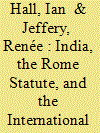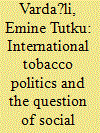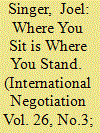| Srl | Item |
| 1 |
ID:
184662


|
|
|
|
|
| Summary/Abstract |
Despite its long-standing rhetorical support for an international criminal justice regime, India continues to resist signing the 1998 Rome Statute that created the International Criminal Court. This article explores the reasons for this reluctance. It observes that during the negotiations that led to the Rome Statute, India voiced multiple objections to the design of the ICC, to how it was to function, and to the crimes that it was to address. It argues that analyzing the negotiating strategy India employed during those talks allows us to discern which reasons mattered more to New Delhi and what accounts for India’s ongoing refusal to sign the Rome Statute.
|
|
|
|
|
|
|
|
|
|
|
|
|
|
|
|
| 2 |
ID:
131460


|
|
|
|
|
| Publication |
2014.
|
| Summary/Abstract |
A proliferation of scholarly works offering a variety of modernization experiences facilitated an understanding of social protests in non-western settings. Focusing on the initial stages of modern social movements in Iran and the Ottoman Empire, this study makes a comparative analysis of the tobacco protests at the turn of the twentieth century. The social protests against foreign tobacco monopolies are regarded as a key moment for the emergence of modern social movements in these countries. Scrutinizing the negotiation strategies, social value systems and political structures of these countries, it is suggested that these tobacco protests played a catalytic role in the process of capitalist incorporation and adaptation to the accompanying value systems of modernism and liberal democracy.
|
|
|
|
|
|
|
|
|
|
|
|
|
|
|
|
| 3 |
ID:
184712


|
|
|
|
|
| Summary/Abstract |
In bilateral relations and negotiations with the European Union (EU), smaller and economically weaker states are often unable to express their national preferences. Despite their limited bargaining power, however, some Eastern Partnership (EaP) countries obtained significant concessions from the EU. This article analyzes the factors that explain EaP states’ unexpected negotiation success in the context of the Deep and Comprehensive Free Trade Agreement (DCFTA) with Ukraine, the Comprehensive and Enhanced Partnership Agreement (CEPA) with Armenia, and enhanced economic partnership with Belarus. We identify negotiation strategies that are crucial to understanding of the puzzle.
|
|
|
|
|
|
|
|
|
|
|
|
|
|
|
|
| 4 |
ID:
180890


|
|
|
|
|
| Summary/Abstract |
This article analyzes one procedural prenegotiation issue that may seem minor in comparison to the substantive questions at hand, but can become consequential regarding its impact on the negotiation and its outcome. How the negotiating table is configured and where the parties will sit is the focus of our analysis. We examine how these questions were addressed in advance of key Vietnam and Middle East peace talks. The study assesses various strategies that were employed effectively to blur potential visual manifestations of symbolic and precedential advantage by one side.
|
|
|
|
|
|
|
|
|
|
|
|
|
|
|
|